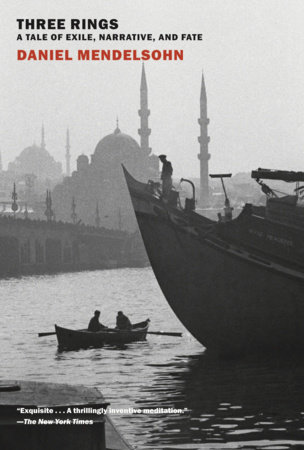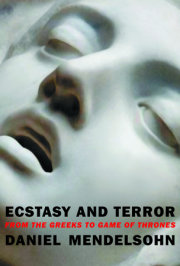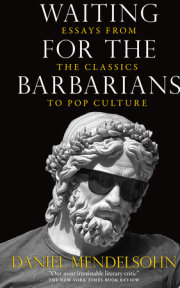"Three Rings shows Mendelsohn at his most learned and most engaging. . . . Mendelsohn combines memoir, criticism and formal experimentation with great poise. His book is an artisan product: short, skilfully constructed, and of a lasting quality." —Alexander Wells, Exberliner
“Exquisite . . . Three Rings digresses from its digressions, whirling with elegiac elegance from the ‘Odyssey,’ which itself veers away from the main tale only to wind home again . . . Ornate and oneiric, the results are well worth circling and circling back to. A thrillingly inventive meditation.” —The New York Times Book Review
"Spectacular . . . a brilliant journey. Three Rings has echoes of Jorge Luis Borges, Italo Calvino, Walter Benjamin and Hannah Arendt. [Mendelsohn] is one of the very few male scholars and critics who put almost equal emphasis on knowledge and feelings. The result is a book that is as nuanced, insightful and well informed as it is honest, raw, painful and touchingly human." —The Times Literary Supplement
“Classicist, historian, memoirist, cultural critic, wit—with consummate skill and the sharp, sympathetic eye of the poet Daniel Mendelsohn brilliantly combines these roles. Three Rings is a masterly exegesis and demonstration of digression as a high art.” —Joyce Carol Oates
“Daniel Mendelsohn’s Three Rings is erudition, essayism, and memoir, made to dance together like a visible clockworks—or literary scholarship such as Ricky Jay might have practiced it onstage. This little book is ruminative, humane and gorgeously precise.” —Jonathan Lethem
“Mr. Mendelsohn’s eighth full-length work is itself a book that springs from other books, including his own. It is a brief but bountiful mashup of criticism, literary biography, craft essay and personal history. As always, the author’s voice blends authority with considerable warmth and charm, luring readers into his complex intellectual enthusiasms. . . . Three Rings, a short but profoundly moving work, clings with tenacity to a belief in the regenerative power of literature.” —The Wall Street Journal
“A stunning piece of criticism . . . Three Rings is not just a continuation of An Odyssey, a mere expansion on a theme. Something has changed in the new book. You might say that between An Odyssey and Three Rings, the question of ring composition shifts from a literary concern to a metaphysical one. The stakes in this new book have been raised: this isn’t just about the mechanics of storytelling but the fabric of the cosmos.” —James K. A. Smith, Literary Hub
“This slim volume swirls with Daniel Mendelsohn’s sublime reflections on history, architecture, religion, theater, literature, scholarship, and on his own life. To read it is like spending a few hours with a brilliant, captivating conversationalist whose ardor for his subjects is contagious. It’s an intellectual adventure, and a brilliant achievement.” —The Jewish Book Council Review
“[Mendelsohn is] a gifted guide. . . . He performs digression in this slim volume, and he does so with grace and power. In other words, he provokes readers to ponder our own lives even as he instructs us in the narrative traditions we might use to make sense of ourselves.” —Tablet
“This luminous narrative, in which the tales of each of Mendelsohn’s three chosen exiled writers appealingly intertwine, is about many things—memory, literature, family, immigration, and religion . . . This slender, exquisite book rewards on many levels.” —Kirkus Reviews (starred review)
“A fine study of digression, exile, and circularity. Mendelsohn’s talent with descriptive detail brings his work alive, such as repeated descriptions of Auerbach, while exiled in Istanbul, gazing through a palace window over the turquoise Sea of Marmara. Mendelsohn never fails to entertain as he takes the reader across thousands of years’ worth of literature and lives.” —Publishers Weekly
“Astounding. A Borgesian document of clarity and brilliance, a book about telling stories that wanders down the seeming two roads of the Hebrew tradition and the Classical, which, like Proust’s two ways, might turn out to be one way after all. Three Rings has the keeled force of a long poem.” —Sebastian Barry
“Contained in the interwoven circles of this slim, labyrinthine book is a vision that encompasses the world. Part dirge, part memoir, part exegesis, all rhapsody—Mendelsohn’s anatomy of literature’s subtlest pleasures is itself that subtlest of literary pleasures: a masterpiece.” —Ayad Akhtar, Pulitzer Prize-winning author of Homeland Elegies





